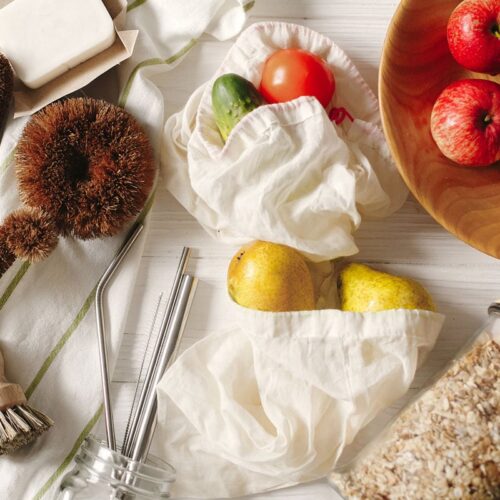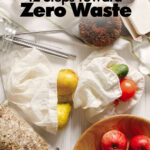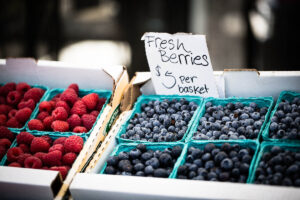Spending a big chunk of my days in kitchens has made me very aware of waste. Restaurants try extremely hard to avoid waste, as no business can afford to toss money away. But we’ve all felt that sinking feeling when we discover that container of forgotten leftovers in the back of the fridge. And we’ve all seen the news reports of plastic garbage choking the oceans and landfills overflowing.
It’s easy to feel helpless. But changing a few simple habits through kitchen resolutions — and creating a few new ones — can and will make a big impact. Here are a dozen simple ideas to save both money and resources.
- Bag It
Reusable bags are an obvious one and pretty much the law in some states; keep a stock of reusable grocery bags in the car. When you do forget, ask for paper bags, which can easily be recycled. Reusable produce bags are also available, as those little plastic bags are a huge waste. Or skip produce bags altogether; they’re not required. Reuse plastic bags (when you have to get them); pet waste bags, wastebasket liners, etc., can all come from your shopping trips. - Don’t Overbuy
Buying too much food, especially fresh food, is a huge cause of food waste because we can’t always eat it before it goes bad. The best way to avoid waste is to take a cue from restaurants and inventory and plan. Think about menus ahead of time; a simple way to do this is to have a list of go-to recipes you make every week or two. Then make a shopping list, and avoid getting off-the-list items. If you do have the urge to buy a lot of fresh food, plan on freezing the surplus right away for use later.
Get more tips for shopping at the farmer’s market. - Buy Local
The USDA estimates that 30-40% of all food in the U.S. is wasted, and not all of that comes from the back of your fridge. Large, complex food supply chains create waste and spoilage, especially with processed food. When you buy from local sources, you get fresher, less-processed food and you support your local economy. - Eat More Plants, Less Meat
Okay, I love meat probably more than the next two people combined. But meat is much more resource-intensive than plants. A simple solution is to eat better meat, less often. By better meat, I mean local or high-quality U.S.-produced meat, often organic, that comes from farms that commit to good farming practices, like Snake River Farms. And non-meat meals, even vegan meals, are no longer fringe. The best chefs in the world are creating amazing plant-based cuisine, and that’s trickling down to your supermarket. - Pay Attention to Packaging, Especially Plastic
Some foods come with way more unnecessary packaging than others. And just because plastic has a recycling symbol on it doesn’t mean it will be recycled, even if you toss it in your bin; US EPA says only 9% of plastic is actually recycled due to technical issues and lack of demand for recycled plastic. - Use Everything
Make carrot tops into a delicious pesto and turn bones into a delicious and versatile stock or broth — try to use everything you buy instead of just the main attraction. It takes a little imagination, but if you’re a fan of Salt Pepper Skillet you’re probably already into being creative and enjoy the process. - Save It Right
If you’re going to save food and avoid waste, you need the right tools to store it. Using glass or Tupperware with tight sealable lids eliminates the need for one-time-use plastic wrap. Large-mouth jars from pasta sauce can work great. And special containers with a vacuum seal keep food even fresher, longer. - Have a Pantry/Fridge-Cleaning Meal Weekly
Get creative with what you already have in your pantry. Put everything that needs to be used in a creative pasta, soup or casserole, or search online by ingredients for a recipe. And dinner doesn’t have to have a “main course” if all you have is little bits of a lot of things. Tapas parties are awesome! Tapas, where you serve a bunch of small random dishes, turn into amazingness and so much fun while using up your food. - Compost the Rest
Anything that can’t be consumed can be composted and used to nourish your garden and start the cycle over again. I use (and highly recommend) the Vitamix FoodCycler to turn all our food waste and scraps into nutrient-rich fertilizer. Compost bins are great for small yards or there are plenty of DIY instructions online for making your own. - Save Water for Your Plants
Leave a collapsible bucket or a watering can in your tub to fill when warming up the shower water instead of letting it go down the drain. When it’s full, simply water your plants. You can also save non-soapy kitchen water for the garden when rinsing veggies or dishes; just use a pot and reward your thirsty plants. - Use Fewer Paper Towels (or Eliminate Them Altogether)
Buy a big pack of inexpensive kitchen/bar towels. They are excellent for drying hands at the sink, using as pot holders, sopping up spills and for wiping the counters. Just use them for the evening and throw them in the laundry. - Bring a Bottle and/or Travel Mug
Avoid plastic water bottles and paper or plastic coffee cups at all costs. Drinking bottled water might be convenient, but it’s such a waste. Not only is there a ton of waste from the plastic bottle itself, but think of the transportation to get that little bottle to you. Especially when it comes from halfway around the world. If you like fizzy drinks, get a SodaStream.
Read more ways to reduce food waste at home for more ideas.
Favorite Products That Make an Impact
- Vitamix FoodCycler FC-50
- Reusable produce bags
- Kitchen/bar towels
- SodaStream
- Stasher Reusable Silicone Food Storage Bags
- FoodSaver Vacuum Sealer
- Collapsible bucket
- Yeti Rambler Tumbler and Hydro Flask Water Bottler
More Kitchen Tips Articles
With all the ways to enjoy the pork, here are a few really delicious ways.






